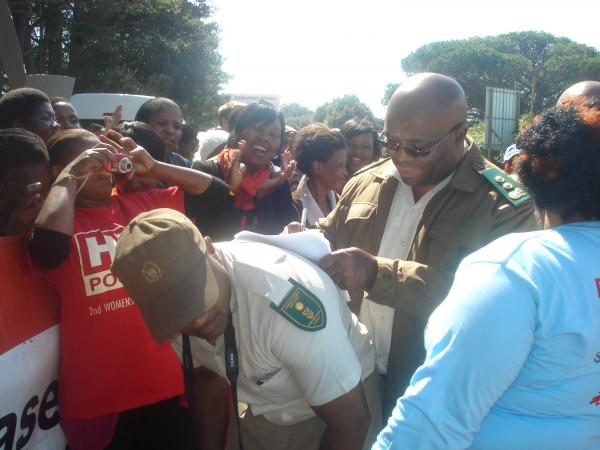TAC pickets in support of man who got TB in prison

Dudley Lee contracted TB while he was an awaiting trial prisoner. Now he’s suing the state.
Dudley Lee was arrested in 1999 and spent the next four years in Pollsmoor Prison, while he was tried for fraud and other financial crimes. About 70 court appearances later, he was found not guilty. While in prison he became sick with TB. He sued the Department of Correctional Services for compensation. The Cape High Court found in his favour, but this judgment was overturned on appeal by the Supreme Court.
Yesterday, Lee’s appeal against the Supreme Court of Appeal’s judgment was heard in the Constitutional Court. The Treatment Action Campaign, together with Wits Justice Project and the Centre for Applied Legal Studies were admitted as friends of the court and represented by the human rights law organisation, SECTION27.
In Cape Town, about 300 members of the Treatment Action Campaign (TAC) and their allies picketed outside Pollsmoor prison in support of Lee. At the same time in Johannesburg, about 100 TAC members demonstrated outside the Constitutional Court.
The TAC wrote on Monday, “At the heart of the case are the rights to health and conditions of detention that are consistent with human dignity.” The organisation explained that the Supreme Court of Appeal judgment made it impossible for a prisoner to win a civil damages claim against the Department of Correctional Services for causing him or her to become infected with TB. “If the SCA’s judgment stands, victims will be left without a remedy for violations of their rights,” the organisation said. “The Department of Correctional Services will be permitted to disregard its obligations with impunity and public health will continue to decline due to rampant TB transmission in prisons and beyond.”
Pollsmoor Area Manager, Mr Ntobeko Mketshane, received a memorandum from the TAC protesters yesterday. The TAC memorandum made several demands: prisoners must be able to spend more time outside their cells (currently awaiting trial prisoners typically spend 23 hours a day in cells), cells must be improved to lower the risk of TB infection, nursing vacancies must be filled, prisoners must be screened for TB when entering the prison and regularly when in prison.
Mketshane acknowledged that TB was a huge challenge in prisons and welcomed the memorandum. He invited the demonstrating organisations to meet with the prison managers to come up with possible solutions to the TB problem. He said that the Department of Correctional Services could not succeed alone but needs all the support it can to get rid of TB in prisons.
This contrasted with comment that the Department of Correctional Services gave to GroundUp in June when we first covered the Dudley Lee story. Spokesperson for the Department, Sibongile Promise Khumalo, said, “Pollsmoor does not need to improve on TB prevention as we already adhere to infection controls, protocols and guidelines.”
In the Constitutional Court hearing, the Department of Correctional Services’ advocate conceded that prison management of TB was poor. The state’s argument, based on the Supreme Court of Appeal judgment, is that Lee’s lawyers have failed to show that if the state had implemented reasonable TB control measures, he would not have contracted TB anyway. The TAC’s lawyers presented a study published by scientists last year in the South African Medical Journal that showed that if the state implemented various measures it could significantly reduce the risk of awaiting trial prisoners getting TB.
Next: A union key to a really democratic future
Previous: Lance Armstrong: It’s about the bike, not the boosters

This article is licensed under a Creative Commons Attribution-NoDerivatives 4.0 International License.


